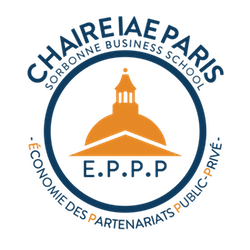Documents de Travail
Le contrat de PPP à l’épreuve des contentieux : Retours d’expériences sur le cas français
Numéro: 2017-1 Thierry Kirat et Frédéric Marty – Le contrat de PPP à l’épreuve des contentieux : Retours d’expériences sur le cas français Résumé : Contrats de long terme portant sur des services complexes, les partenariats public-privé peuvent donner lieu à des différends entre les contractants ou avec d’autres parties prenantes tant dans leurs phases de passation que d’exécution. Se fondant principalement…
Lire la suiteWhen does ideology matter? An empirical analysis of French municipalities’ make-or-buy choices
Numéro: 2016-5 Jean Beuve and Zoé Le Squeren – When does ideology matter? An empirical analysis of French municipalities’ make-or-buy choices Abstract: Many empirical studies have analyzed the factors that influence local government decisions regarding the management of public services. In those studies, ideological motives are often found to be not, or at least very slightly, significant. This absence of ideological…
Lire la suiteThe law of small numbers: Investigating the benefits of restricted auctions for public procurement
Numéro: 2016-4 Lisa Chever, Stéphane Saussier and Anne Yvrande-Billon – The law of small numbers: Investigating the benefits of restricted auctions for public procurement Abstract: A commonly accepted view in the academic literature is that dispensing with competition may only be beneficial when tendering complex contracts. However, restricted auctions are frequently used among EU-member states to procure small contracts (OECD, 2010). In…
Lire la suiteLes obligations à impact social : une nouvelle génération de PPP pour les politiques sociales ?
Numéro : 2016-3 Frédéric MARTY – Les obligations à impact social : une nouvelle génération de PPP pour les politiques sociales ? Résumé : Expérimentés depuis quelques années au Royaume-Uni et aux Etats-Unis, les Social Impact Bonds (SIBs) visent à faire financer par des investisseurs privés des programmes sociaux en conditionnant leur remboursement et leur niveau de rémunération financière à…
Lire la suiteLe diable est-il dans l'annexe ? Les risques budgétaires des PPP saisis par le traitement des passifs éventuels
Numéro : 2016-2 Frédéric MARTY – Le diable est-il dans l’annexe ? Les risques budgétaires des PPP saisis par le traitement des passifs éventuels Résumé : Les contrats publics globaux à long terme, dont les PPP, ont été vivement critiqués par la Cour des comptes, et par le rapport d’information des sénateurs Portelli et Sueur, sur la base…
Lire la suitePublic-private partnerships from budget constraints: Looking for debt hiding?
Numéro: 2016-1 Marco BUSO, Frederic MARTY, and Phuong Tra TRAN – Public-Private Partnerships from Budget Constraints: Looking for Debt Hiding? Résumé : The use of Public-Private Partnerships (PPPs) to realize and operate public infrastructures is often associated with fiscal circumventing motivations.Using data at the municipal level, this paper investigates whether budget-constrained public authorities adopt PPPs in order to hide public debts.…
Lire la suiteAre Public Private Partnerships that Rigid? And Why? Evidence from Toll Road Concession Contracts
Numéro: 2015-6 Laure ATHIAS and Stéphane SAUSSIER – Are Public Private Partnerships that Rigid? And Why? Evidence from Toll Road Concession Contracts Abstract : Transport concession contracts are commonly said to be standardized and too rigid. They would not allow public authorities to adapt them to evolving context and circumstances. This paper aims at challenging this view and, more particularly, the view that contractual rigidity…
Lire la suiteContractual Choices and Technical Efficiency in Public Procurement: The Case of Regional Railway Transport in France
Numéro: 2015-5 Miguel Amaral and Jean-Christophe Thiebaud – Contractual Choices and Technical Efficiency in Public Procurement: The Case of Regional Railway Transport in France Abstract: This paper contributes to the analysis of the impact of contractual design on the performance in public procurement. It focuses on the case of railway regional transport in France, where the regions were given the prerogatives…
Lire la suiteVertical Separation in Rail Transport: How do Prices Influence Coordination?
Numéro: 2015-4 Miguel Amaral and Jean-Christophe Thiebaud – Vertical Separation in Rail Transport: How do Prices Influence Coordination? Abstract: This paper contributes to the debates over the relative performance of governance modes in network industries. The issues of vertical separation and integration in network industries have been extensively studied from several perspectives including competition eff ect, production cost synergies or coordination costs.…
Lire la suiteThe Quality of Governance and the Use of Negotiated Procurement Procedures: Evidence from the European Union
Numéro: 2015-3 Eshien Chong, Michael Klien and Stéphane Saussier – The Quality of Governance and the Use of Negotiated Procurement Procedures: Evidence from the European Union Abstract: A key phase in any public-private contracting setting involves the selection of a private contracting partner. Although open competitive tenders (open auctions) are usually the preferred mechanism, recent developments in the academic literature have pointed…
Lire la suite
